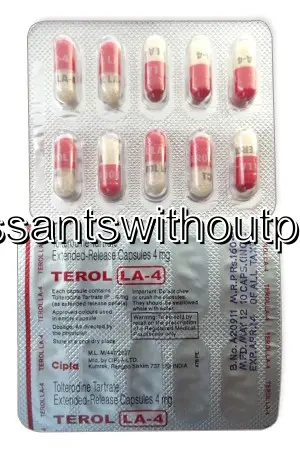Buy Tolterodine Online in New Zealand — No Prescription Needed
| Package | Dosage | Price | Price per Dose | |
|---|---|---|---|---|
| Dosage: 4mg | ||||
| 120 pill | 4mg | NZD1,052.31 | NZD8.76 | |
| 90 pill | 4mg | NZD794.65 | NZD8.84 | |
| 60 pill | 4mg | NZD558.69 | NZD9.30 | |
| 30 pill | 4mg | NZD311.88 | NZD10.36 | |
| 10 pill | 4mg | NZD135.58 | NZD13.51 | |

Tolterodine Description
Overview of Tolterodine
Tolterodine is a medication commonly prescribed to manage symptoms associated with overactive bladder. This condition often causes a sudden urge to urinate, frequent urination, and in some cases, incontinence. Tolterodine belongs to a class of drugs known as anticholinergics, which work by blocking certain nerve signals in the bladder. As a result, it helps to relax the bladder muscles, increasing the bladder's capacity and reducing the urgency and frequency of urination. This medication has been widely used for many years and is considered effective for many patients suffering from bladder overactivity.
How Tolterodine Works
The primary mechanism of Tolterodine involves its ability to target and inhibit muscarinic receptors in the bladder. These receptors play a crucial role in controlling the involuntary contractions of the detrusor muscle, which is responsible for bladder movements. By blocking these receptors, Tolterodine reduces the frequency and intensity of bladder contractions. This leads to improved control over urination and a decrease in episodes of incontinence. The drug's selectivity towards bladder receptors helps minimize widespread side effects that could occur with less targeted medications.
User Experience and Effectiveness
Many patients report significant improvement after starting Tolterodine therapy. Symptoms such as urgent and frequent urination tend to diminish within a few weeks of consistent use. The medication's effectiveness is often confirmed through patient feedback and clinical assessments. While it does not cure the underlying cause of overactive bladder, it offers symptomatic relief and improves the quality of life for those affected. Some users may need to adjust the dosage or try different formulations (such as controlled-release tablets) to find the most tolerable and effective option. Adherence to the prescribed regimen is vital to achieving the best results.
Possible Side Effects
Like many medications, Tolterodine can cause side effects. Common adverse reactions include dry mouth, constipation, dizziness, and headache. These are usually mild and tend to diminish over time as the body adjusts to the medication. Less common but more serious side effects can include blurry vision, urinary retention, or allergic reactions. Patients with pre-existing conditions such as glaucoma, urinary retention, or gastrointestinal issues should inform their healthcare provider before starting treatment. Monitoring and communication with a healthcare professional are essential to ensure safety and to manage any adverse effects proactively.
Precautions and Considerations
It is important for users to follow their healthcare provider's instructions closely. Dosage adjustments may be necessary based on individual health profile and response to treatment. Patients should avoid alcohol and certain other medications that can interact with Tolterodine, increasing the risk of side effects. Pregnant or breastfeeding women should consult their doctor before use, as safety data may be limited in these populations. Regular check-ups can help confirm that the medication is working well and that no significant side effects are occurring. Compatibility with other medications should always be discussed with a healthcare professional to prevent potential interactions.

